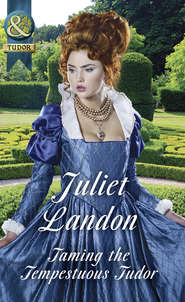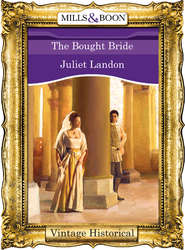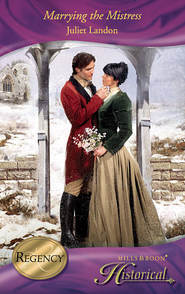По всем вопросам обращайтесь на: info@litportal.ru
(©) 2003-2024.
✖
A Most Unseemly Summer
Настройки чтения
Размер шрифта
Высота строк
Поля
Chapter Three
A lthough the notion had taken root in Felice’s mind that she might have to stay at Wheatley Abbey after all, Sir Leon’s high-handed tactics hardly bore the hallmarks of subtle persuasion. Added to their disastrous introduction, it was this that made her almost wild with anger and humiliation to be so brazenly manipulated first by Lord Deventer and then by his surveyor. It was almost as if they saw it as some kind of game in which her wishes were totally irrelevant. As for his talk about taming her, well, that was ludicrous. Men’s talk.
‘Tamed, indeed!’ she spat. ‘You’ve bitten off more than you can comfortably chew, sir!’ She threw a fistful of bread scraps to the gaggling ducks, scowling approvingly at their rowdiness.
Her companion on the afternoon stroll was Mistress Lydia Waterman, whose insight was heart-warming. ‘Take no notice, love,’ she called from further along the river’s edge. ‘You know what they’re like. They have to be given a sense of purpose. We could do worse, though, than be stranded in a place like this, and at least you have plenty to do. Just look at it; it must have been swarming with monks twenty years ago.’
To one side of them the river cut a tight curve that enclosed the abbey on two sides before disappearing beyond the mill into woodland. Where the grass and meadowsweet had recovered from the builders’ feet, creamy-white elder blossom drooped over ducks, geese and swans that jostled for food. They launched themselves into the water in dignified droves as Felice’s two deerhounds pranced towards them.
Wheatley Abbey had been left in ruins for twenty years after the English monasteries were closed and their wealth taken by the present queen’s father, Henry VIII. But the villagers had won permission to keep the church for their own use while the rest of the abbey buildings had been bought by Lord Deventer whose programme of rebuilding had already lasted two years. During that time, his talented thirty-year-old surveyor had restored and converted first the Abbot’s House and then the New House, which had once been the monks’ refectory, dormitory and cellarium. The enclosed cloister still awaited attention, and the guesthouse, which at present stood apart from the other buildings, was being used as Sir Leon’s offices and some of the masons’ accommodation. There was still plenty to be done, but work on the New House was almost complete: courtyards, kitchens, stables and smithy, storerooms and dairy had all been rebuilt from the monks’ living quarters.
Even the church had had to adapt to the religious changes of the last twenty turbulent years. The young Queen Elizabeth was more reasonable than her forebears in her dealings with religion, but even she was not immune to pressure from her councillors to take a harder line with those who found the changes too difficult to accept, like Felice’s mother, for instance. Lord Deventer himself cared little one way or the other but had taken on the young chaplain, Timon Montefiore, for the sake of his staunch Roman Catholic new wife who saw no harm in breaking the law every day of the week while relenting for an hour or two on Sundays, just to avoid being fined.
Felice and Lydia strolled along the river’s edge in silence in the direction of the village and a wooden bridge under the dense white candles of a chestnut tree. A familiar figure came from the opposite side, joining them midway over the green swirling depths where a rowing boat was tied to one of the bridge supports. A clutch of small children fished with excited intensity, calling to Dame Celia as she crossed.
‘They’ve been doing that for centuries,’ she smiled. ‘I did it myself when I was a wee child, though never on a Sunday.’
‘You lived here as a child?’ Felice said. ‘I didn’t realise.’
Slowly, they meandered along the opposite side of the river away from the thatched rooftops that appeared through the trees. Dame Celia pointed the way she had come. ‘Down there,’ she said, ‘at the end of the village. You’d have passed Wheatley Manor the other day as you came through. My parents owned it, but now my brother and his family live there. John and I have the priest’s house on the Wheatley estate.’
‘So you went away to be educated, Dame Celia?’ said Felice.
‘With the nuns at Romsey until I was fifteen. It’s only a few miles away. But it was closed down at the same time as Wheatley and everyone was turned out. I was fortunate in being able to come home, but the nuns and novices had a much harder time of it.’
They sat on a log that had recently been felled, its stump still oozing with sticky resin. Lydia sat on Dame Celia’s other side. ‘Then you didn’t consider taking vows?’ she said.
‘Not I!’ Dame Celia laughed. ‘You see, John had been abbot of Wheatley only a year when the abbey closed. He was the youngest ever. And I had returned home to live when he took the post as chaplain to my parents, and as vicar at the church here. No one had better qualifications for those jobs than the former abbot. So that’s how we came together.’
Felice’s heart skipped a beat. Chaplain and employer’s daughter. ‘Did your parents approve?’ she said.
Dame Celia’s comfortable face crumpled in amusement. ‘Certainly not, my lady. But John was given a goodly pension and he was very persuasive. But it was a very unsettled time, you know, with all the changes. At first, the former monks and nuns were allowed to marry; priests were even allowed to marry their former mistresses and concubines. Then the young King Edward decided they were not, and we swung from being Catholic to Protestant twice in the space of four reigns, m’lady, and it left everyone a bit troubled. Especially people like Dame Audrey and her Thomas.’
Felice recalled the steward’s bejewelled wife, her sadly pretty face and her pseudo upper-class accents. ‘Oh,’ she said. ‘Was Dame Audrey at Romsey Abbey, too?’
‘She was a young novice when it all came to an end. Audrey Wintershulle, she was then, a very pretty girl.’
‘But then she married the sacristan. Why was that so troublesome to her?’
‘Well, you see, they were unfortunate because Thomas had been appointed only a few months before the date was set for the abbey’s closure so he received only a small pension, barely enough to live on, so he took the job of chantry priest here at the church to say prayers for the dead. But then when the young King Edward came to the throne, all the chantry chapels were abolished and the money used for other purposes, schools and such-like. So poor Thomas was out of a job again. Then when the abbey was eventually sold off to Lord Deventer, Thomas was taken on as steward to oversee the property and maintain it. No one else could have done that better than Thomas; he knows the abbey like the back of his hand.’
‘But what did he do for a living between times, Dame Celia? Surely he couldn’t live off his pension alone?’
‘John helped him out,’ the dame said. ‘He’s been so good to them both.’
But on such a small pension, Felice wanted to ask, why did he take a wife? Especially one with such extravagant tastes. Surely the vicar’s assistance didn’t stretch as far as jewels and furs, did it? There was more she would like to have known about the strangely matched Vyttery couple, but she had no wish to pry. Instead, she turned her attention back to the vicar’s wife who appeared to have suffered few financial problems, for all her simplicity of dress.
‘And does your husband approve of all the alterations to the abbey?’ She looked across the river to the New House of pale grey stone, solid and glittering with tiers of windows that only the very wealthy could afford in such quantity. It sat at an angle to the Abbot’s House next door, dwarfing it by its sheer bulk and magnificence.
‘Oh, John is very adaptable,’ said Dame Celia. ‘He’s had to be with so many changes. But, yes, he admires Sir Leon’s work. They’ve always got on well together.’
‘They’ve known each other long?’ Felice’s question was casual, though she doubted whether it would deceive the motherly lady at her side.
‘Only over the time they’ve been working together. Sir Leon’s been responsible for several abbey conversions in the south. He’ll never be short of work. Everyone thinks very highly of him.’
‘Of him, or of his work? Isn’t he somewhat difficult to work for?’
Dame Celia smiled and laid a gentle hand on Felice’s pink sleeve. ‘Men like him hate any interruption to their work, m’lady. They can only think of one thing at a time, not like we women. One has to humour them to keep the peace.’
Felice and Lydia laughed, having harboured the thought many times but not heard it said out loud by the wife of a former monk. ‘Who does the little boat belong to, Dame Celia?’ said Lydia. ‘The one tied to the bridge back there.’
‘It’s the smith’s. His cottage is next to the inn, very close to where the boat’s tied up. He works the mill near the Abbot’s House.’
‘He works there?’ Felice queried. ‘I thought that’s where the miller worked.’
‘Yes,’ Dame Celia smiled. ‘Smith is the miller. That’s not a cornmill, you see, but a water-powered forge used for the estate. It’s easier for him to carry his heavy things in a boat from one bridge to the other.’
‘Does he work at night?’ said Lydia, brushing the mossy bits off her gown. ‘We thought we heard the paddles going.’
‘He works hard at his drinking,’ the dame said, firmly. ‘He doesn’t have far to go for that. Have you seen inside the New House, yet?’
The idea of dispensing with Sir Leon as tour guide appealed to Felice almost as much as the idea that she could annoy him by her independence, and this was enough to hasten them across the bridge by the mill towards the great flight of stone steps that led to an impressive porch and an unlocked door.
The mansion that had seemed, only a few hours ago, to resemble a rabbit warren now spread from the front entrance in shining newness across pine floors, intricately plastered ceilings, panelled and painted walls, floor-to-ceiling windows and a marble chimney-piece that no one could have missed. It was while they stood in awe, taking in the grandeur of the carved staircase, that voices penetrated a heavy door behind them only seconds before it opened.
Felice tensed as she recognised one of them, and her quick turn to examine the coat-of-arms above the fireplace gave Dame Celia the chance to greet the men with far more geniality than Felice could have done.
‘Sir Leon…John…and Marcus! Well, what are you doing here?’
Half-turning, Felice watched from a distance as her two disloyal deerhounds made a fuss of Sir Leon, and the newcomer named Marcus greeted Dame Celia with a familiar kiss to both cheeks. He was, she thought, probably a year or two younger than Sir Leon and of slighter build, but dashingly well set-off by an immaculate suit of honey-coloured velvet and satin, by white linen, lace, gold buttons and braids. His face was lean and good-humoured, almost handsome, his hair curled in a carelessly arranged fair mop that fell into heavy-lidded blue eyes. His manner exuded a gentle charm that contrasted immediately with Sir Leon’s dark dynamism and animal grace.
His greeting to Dame Celia over, the man called Marcus made a beeline for Felice that forestalled any introduction, taking her by surprise with a bow and one hand placed over his heart. ‘Ah, lady!’ he sighed. ‘If you would consent to marry me, here and now, we can use this good priest here, and yonder chapel, to unite our souls without delay. Now, tell me you consent or I shall go away and die.’
Вы ознакомились с фрагментом книги.
Приобретайте полный текст книги у нашего партнера:
Приобретайте полный текст книги у нашего партнера:











